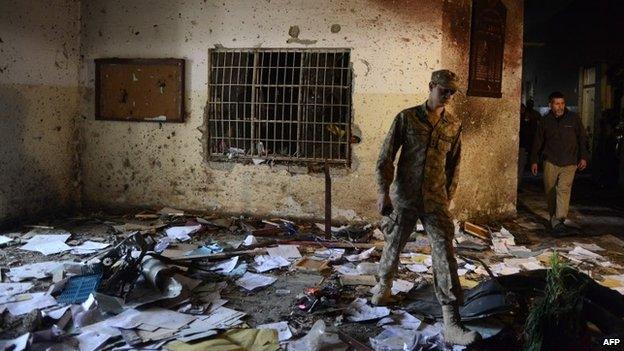Peshawar massacre: The boy who died and the boy who got away
- Published
Pupils are returning to a school in Peshawar that witnessed a massacre last month in which more than 150 students and teachers were killed.
A mother who lost her son and a mother whose son is returning to school gave the BBC harrowing accounts of what happened that day, and what life holds for them now.
Some readers may find some of the following details upsetting and graphic.

Samya Salman's son 14-year-old Aamish was killed in the attack. She describes what happened that day and how she finds the strength to carry on.
It was a day like any other and we were busy getting ready for my sister's wedding.
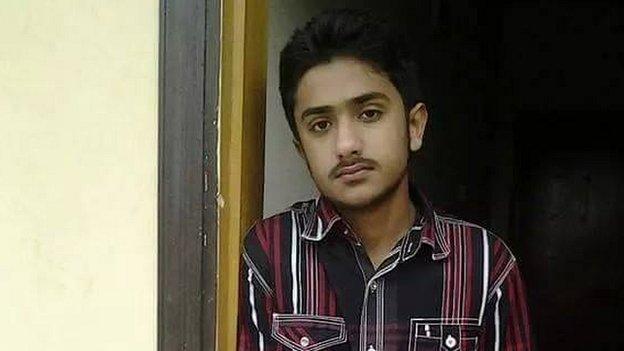
I had no idea about anything until my cousin called me in a panic asking me where Aamish was and whether he was in school or not. She told me to put the TV on and I saw that there was an attack on Aamish's school.
I couldn't comprehend - I thought they must be keeping them hostage.
We searched for him all day: in hospitals, in the park behind the school, in houses near the school, everywhere. We couldn't find him anywhere.
At 16:30 that day my husband called: "Just rest your mind," he said, "I'm bringing the body back home."
It was because of the the injury on his finger that we knew. My brother-in-law recognised him from a cut he got a few days ago, but there was a massive hole in his palm from a gunshot. His face was fine, mostly. One bullet entered through his jaw and exited his neck.
'I'm late for school!'
I had wanted Aamish to take a day off from school so he could come with me as I was shopping for my sister's wedding but my husband said he would be missing too many school days. He got Aamish up for school, slowly stroking his hair till he woke up.
I asked Aamish to have breakfast before he left, but he said: "How can you ask me to have breakfast when I'm late for school?"
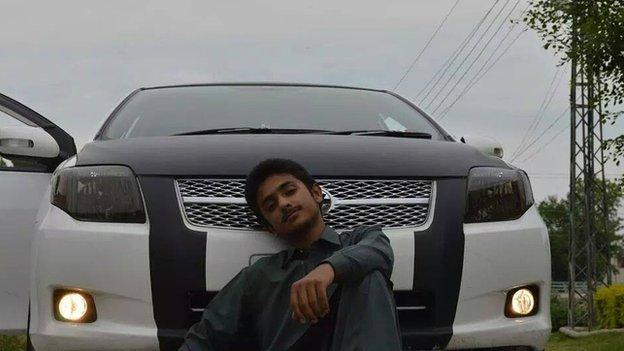
Aamish Salman loved cars and went off-roading with his uncles
But he had breakfast and ran out of the door in a hurry. How was I to know I would never see him again?
He loved sports and maths. And the family loved him. He used to hang out with the neighbourhood kids. He used to go off-roading with his uncles. He was getting into hunting too and loved cars.
He lived so large and I believe he lived his life to the full these last few years. He loved music too. He used to come into my room, put on his earphones, and listen to this song, called "Just Don't Cry". I used to hate that song. And now I listen to it and sense that he was trying to tell me something.
'I have his shoe'
A friend of Aamish's said he saw him run out of the school but then he stopped and ran back inside the school. I don't know why he would run back in. Maybe he went to save someone. I don't know what he was thinking. One of his teacher's said Aamish came back into the auditorium and they shot him then.
They shot him on his left side nine times. From head to toe. He probably didn't even have a minute to breathe and understand what was happening.
I have his shoe. They have blood clots in them. But I don't want his blood wasted. I want change in Pakistan.
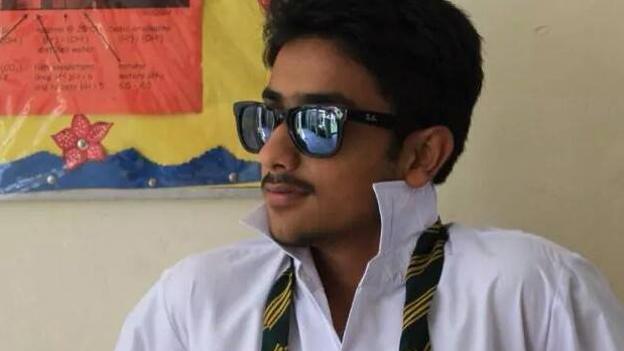
I have a 10-year-old son who goes to another school but now I would never consider putting him in this school. My daughters are in the girls' section and they don't want to go back.
I still see Aamish running around. When I'm alone, I can't think. I think I will go mad. But then I think of Allah. And I will ask him to give me strength.
We need a lot of patience. All us mothers. But I hope our government realises what has happened. I hope they do something. In today's Pakistan everyone is just thinking of themselves. If we don't fix ourselves and take care of each other, our enemies will always find us to be an easy target.
'We have no answers'
The authorities tell school principals to secure their schools and to safeguard the children. What are they supposed to do? Should they start teaching children in schools how to defend themselves with guns. Should they teach them how to pull the trigger instead of the alphabet.
I recall my childhood. Things were never like this. I never saw bombings. I remember one bombing when I was in third grade. But now, it's normal to discuss death. Our kids discuss death all the time. And we have no answers for them.
Interview by the BBC's Shaan Khan.

Mohammad, 17, stayed at home that day. His mother, who wishes to remain anonymous, describes the prospect of sending him back to the school where his friends were killed.
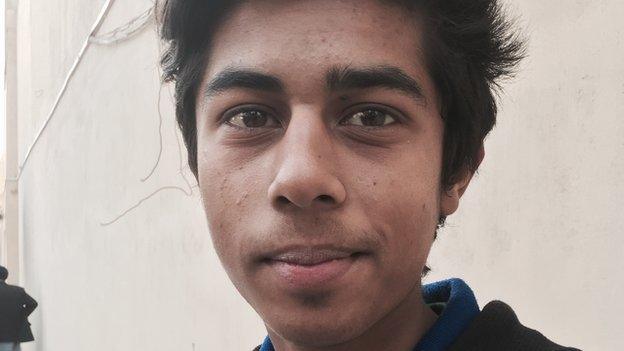
After hearing about the attack a chill went through my spine.
I don't know how to say this, but somehow a part of me was also peaceful with the feeling that my son was at home. His examination schedule gave him a day off but dozens of friends and fellow students lost their lives.
When I returned home I found him weeping. At that moment I did not feel that I loved my son any more than I loved these kids - all his school friends who had died.
My son is wise and brave and he says he is not afraid now. He says he would have tried to save his fellow friends and teachers if he had been there.
This incident has brought us all together in grief. Everybody's heart is broken. When I am sending my kids to school I have two different feelings.
Being a teacher and a Pakistani my feelings are that I and my children are ready to sacrifice our lives for this country. I want to send my children to school and make them so brave that they can defend this motherland.
But I am a mother too and and when that part of me thinks about sending my children to school my heart sinks. No mother should see the day when parents and siblings are rushing to the scene of a massacre.
They blasted mothers' hearts
Those kids who lost their lives were the Abdus Salams' [Pakistani physicist who won Nobel prize] and Bill Gates of the future. But after seeing their innocent bodies riddled with bullets and covered in blood I just want to have my children alive rather than worry about their future prospects.
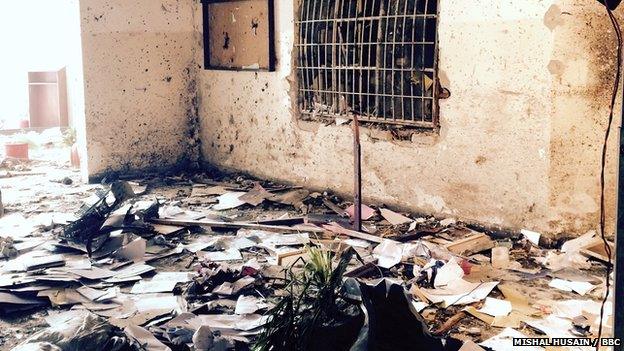
Explosions and gunfire led to 141 deaths and left a trail of destruction in the army-run school.
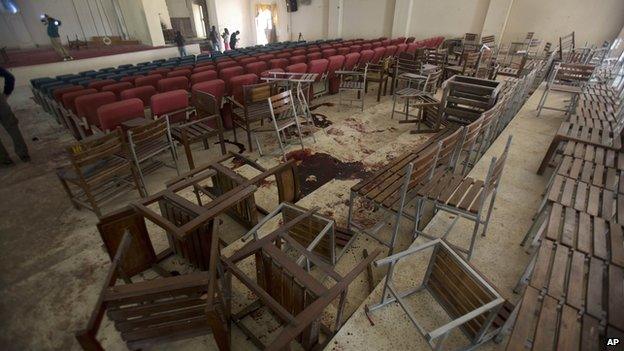
The school auditorium was the site of much bloodshed - students were studying first aid at the time
But I have to send them to school. And then I find myself wishing that I can go with them to school and stay with them until they finish and then bring them back myself. I have two children: when they go to school my body and soul will be divided with them.
My son faces renewed sadness when he goes back to his old playing grounds. He will not think about games but about bloodshed now.
I am lucky and thank Allah for not putting me through this ordeal directly. At the same time I can feel for those mothers whose dreams have been shattered.
On 17 December when my son told me he was going to attend the funeral prayer of his friends I was shaken to the core. This was not his age to attend funeral prayers of his friends.
Bomb blasts in Peshawar are not new but this time they blasted mothers' hearts. I don't know how they can heal.
Interview by BBC Urdu's Haroon Rashid.
- Published22 December 2014
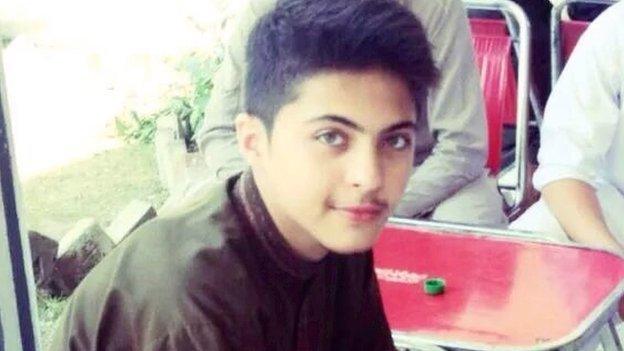
- Published17 December 2014
